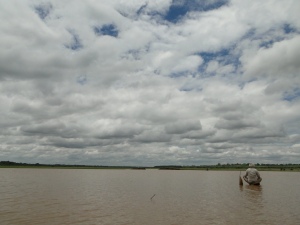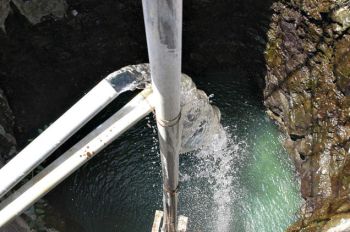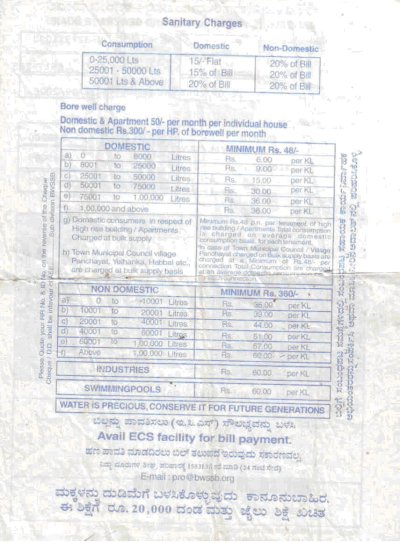Vishwanath Srikantaiah
Sweet smell of success: Human waste fertilises land & turns farmers wealthy in Bangalore
Posted on 17 Mar, 2013 05:07 PMHuman excreta is loaded with nutrients, which when disposed off discriminately, increases pollution and leads to a loss of resources. On an average a human being produces some 500 litres of urine and 50 kilograms of faeces a year, sufficient to fertilise plants that would produce more than 200 kilograms of cereals!
The lake and the well, part of a water master plan - Article by S. Vishwanath about Jakkur Lake in Bangalore
Posted on 28 Jun, 2011 05:41 PMAuthor: S. Vishwanath
Video courtesy: Zenrainman
When a city adds nearly 3 million people in a span of a decade ensuring water supply to its citizens seems a huge challenge. One critical thing to realize is that the mind-set of ‘providing’ water has to change and become one of ensuring that citizens can access water of requisite quality.
Hi-tech vs low-tech in the water sector in the village of Dandiganahalli near Bangalore - Article by S. Vishwanath
Posted on 28 Jun, 2011 05:40 PMEver since Schumacher wrote his now very, very famous book small is there has in my mind been a question of the appropriateness of the solutions we urban educated types posit for rural ‘problems’.
Where our rivers begin - Water literacy for urban India
Posted on 20 Jun, 2011 12:37 PM
 Fisherman on Hessarghatta Lake on the Arkavathy River
Fisherman on Hessarghatta Lake on the Arkavathy River
It is here in a small pond that the Arkavathy river is famously said to originate. It moves down the hill in the form of a spring and enters the first of the man-made reservoirs, called ‘tanks’, the Chikkarayyappanhalli Kere. From thence begins the journey of this tributary to the Cauvery. Passing through a series of tanks built to hold its water for irrigation it comes to the large ‘Nagarakere’ at Dodballapur. The entire drinking water for the town of population 100,000 used to come from this large tank. Moving further on the river comes to the almost 7 sq.km. Large Hessarghatta tank. In 1894 this tank was enlarged and became the first external source of water supply to the city of Bangalore.
Managing shallow aquifers in a city
Posted on 16 Jun, 2011 06:04 PM Good option: The city needs multiple sourcing of water and open wells have the potential to provide up to a third of the requirement
Good option: The city needs multiple sourcing of water and open wells have the potential to provide up to a third of the requirement
Just how a city can be arbitrary with its policy on water management and therefore leading to sub-optimal conditions is made clear by a recent example one came across. Balasubramanian had an old open well dug to a depth of 30 ft. when he first built his house in the early 80s. The well had yielded water for quite some years but then subsequently had gone dry.
Using the metro lines in Bangalore for rainwater harvesting - Article by S Vishwanath
Posted on 27 May, 2011 12:29 PMAs the elevated tracks come up over the city a mass transport network called the metro is being built all over the city. In phases it is likely to cover over a 100 kilometre and become one of the prime modes of transport to the city. Apart from the transport benefits it will bring to the city there is one other potential benefit that could accrue to the city due to its construction.
The metro rail track offers a tremendous potential for rainwater harvesting. A total length of about 45 kilometres and a width of about 12 metres mean that the endowment of rainwater on the relatively very clean track with Bangalore’s rains of 970 mm annually is about 523 million litres. Considering a coefficient of runoff of 0.90 the harvestable rainwater is around 471 million litres annually. This could provide about 13,000 people with their annual requirement of water at 100 litres per day. A substantial sum.
Monsoon 2011 - Get ready - Article by Vishwanath Srikantaiah
Posted on 21 May, 2011 09:53 AMIt’s May already and the advent of one of India’s most awaited natural event the monsoon is nigh. This year according to early reports it may be in the Andaman’s by the 12th of May itself and may arrive in Kerala earlier than June 1st its usual arrival date.
While the city is getting ready cleaning up its storm-water drains and sewerage networks other measures are equally crucial. The de-silting of the various tanks in the city is a must as well as the cleaning up of the channels leading up to them. The overflow weirs and the ‘Rajakaluves’ the channels linking one tank to the other, need to be dredged and de-silted too.
Wastewater reuse in apartment buildings in Bangalore - S Vishwanath
Posted on 14 Apr, 2011 10:12 AMEven if an apartment uses as less as 5000 litres of water a day it must have a wastewater recycling system which does such a thorough job that the treated wastewater is reused to replace fresh water and not for simply disposing off into the environment in a safe way. It is simply not good enough for treated wastewater to be used for watering lawns, an unnecessary demand.
